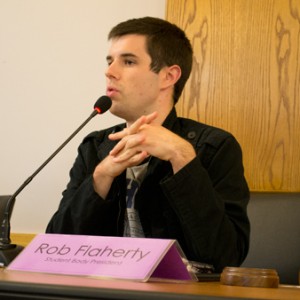There’s a lot of talk these days about the “value” of an Ithaca College education. After four years here, I can say that what makes an Ithaca College education valuable is not integrated core curricula or e-portfolios, fancy new (unusable) buildings or new logos. Perhaps our greatest asset, beyond educational resources, is our strong, passionate and unique community. I’m proud to have been a part of it for the last four years and, of course, for many more to come. But here’s the thing: For a college that claims to produce students that are “civically engaged,” it’s doing a pretty terrible job of letting us be engaged in campus civics. Perhaps the college would do well to have some faith in its product.

You all know the story. We’re being challenged by shifting markets, growing competition for students and the increasing price barrier higher education has built for the last 50 years. If we don’t do something to make Ithaca College more attractive in both experience and in cost, we’re in trouble. This year, the college’s administration took a number of steps to take this school in what it perceived to be the right direction. IC 20/20 was a play at bolstering quality, and the Huron proposals that are now moving to the president’s desk for approval aim to make Ithaca College more affordable.
No one is questioning the need for change, but what needs to be questioned is the way that the changes happen. We lack the campus leadership to bring the community together to come up with solutions that work for all of us. A quick read through The Ithacan this year would bring up quotes from the campus community decrying “top-down leadership,” “corporatism” and a shift toward “we know best” governance. Our culture is shifting — and a lot of us aren’t happy.
That culture shift starts at the top. Being a college president is more than putting on a two-tone school-colored tie and speaking in platitudes about institutional vision. At times of turmoil, we need leadership that takes the needs of a community into account, and to this point, it seems to have been missing. In the process of implementing his vision, President Tom Rochon has made a lot of changes that have served, intentionally or not, to shut students out of the conversation.
We no longer have an administrator specifically advocating for the needs of students on campus at the highest level. We got a restrictive policy that put a wall between student media and the administration. Even the more open process of making the college more efficient, a possible step in the right direction, might just be for show. Requests to have full-time students participate in the highest-level campus budget organ have been met with reassurances that “administration will figure that out.” The student representative on the board of trustees can no longer present their already comically short five-minute summation of all student life on campus.
This is our home, and we care deeply about it, but students are clearly not a valued part of the decision-making process. Students don’t seem to be alone in this. There are rumors of faculty strikes and votes of no-confidence, or staff concerns about commenting on Huron Consulting Group’s proposals for fear of retribution all indicate an unhealthy campus climate.
Instead of making broad assumptions about what students want, perhaps it would do the administration well to actually ask for input from students. The core curriculum of a school isn’t going to sell anyone, but a culture of inclusiveness and opportunity will make us a stronger choice for future students and a stronger place for current students, faculty, staff and alumni.
Rochon has said that he can’t “pull a lever” and make changes. Perhaps that’s true. He can, however, set a tone of inclusiveness and genuine caring about the needs of the community that looks to him for leadership. In the meantime, students, faculty, and staff alike will be trying to make our campus a safe, inclusive place for conversation about out future. It’s just a shame that no one’s listening.
Rob Flaherty is a television-radio and politics major and the outgoing president of the Student Government Association. Email him at [email protected].







